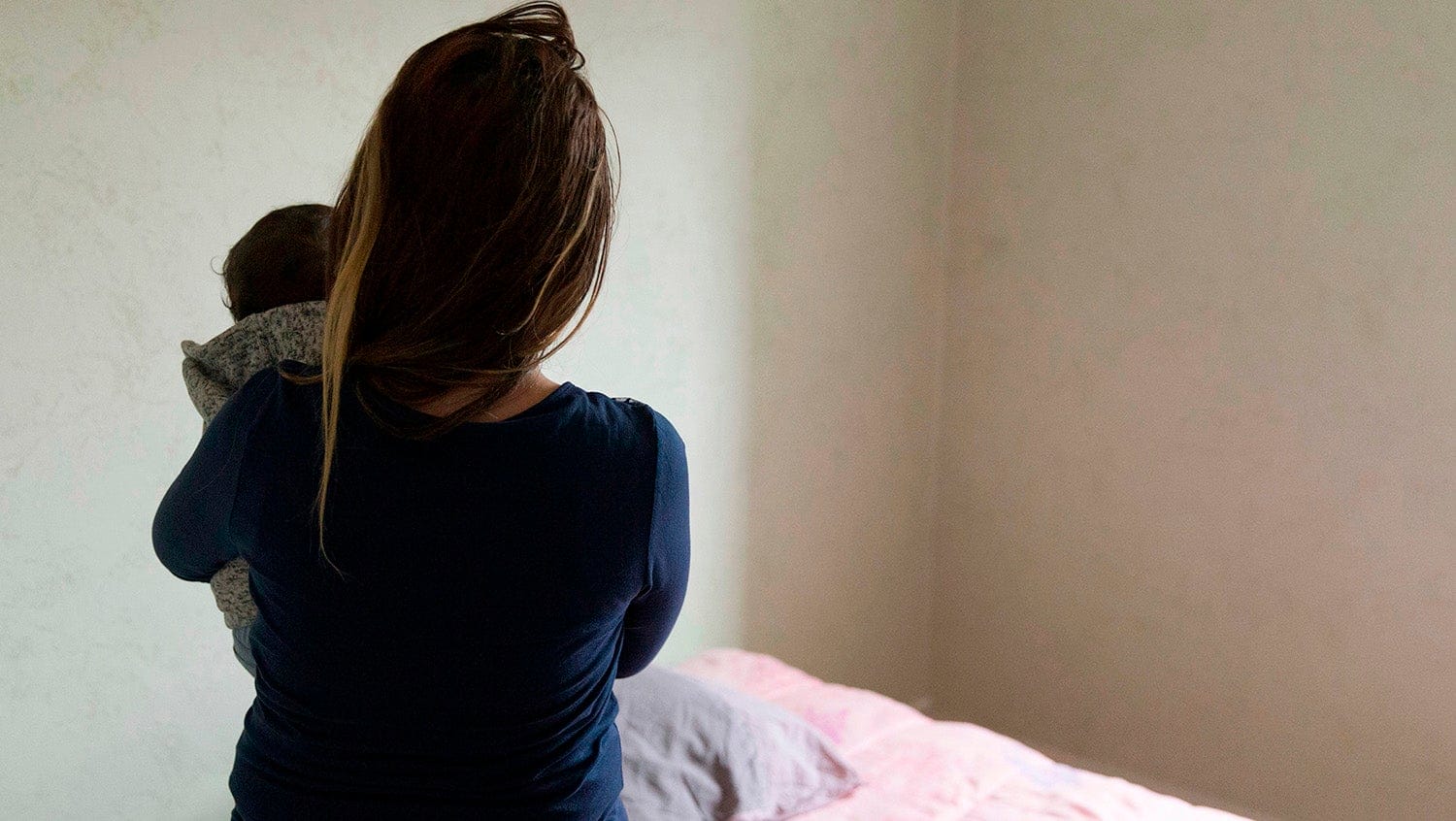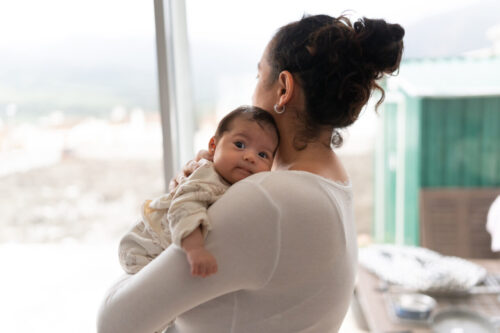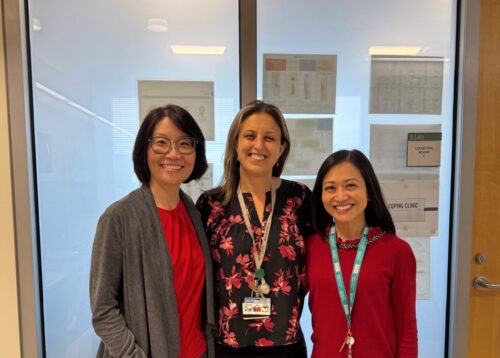Support for Newborn Mothers with Opioid Use Disorder Doesn't Go Far Enough
May 28, 2021
By Meryl Bailey

Geoffroy Van Der Hasselt, Getty Images
After being in addiction treatment during pregnancy, 40% of women relapse within the first year of their baby’s life. Experts advocate for extended support for new moms.
The interruption of medical care and isolation caused by COVID-19 is adding fuel to the opioid epidemic, with dramatically more relapses and deaths over the past year. Nationwide, there has been a 38% increase in opioid overdose deaths, with 10 states reporting over a 98% increase. Women of reproductive age are a growing population with opioid use disorder (OUD), with opioid use among U.S. women giving birth increasing five-fold since 1999.
Eileen Costello, MD, recently testified at a recent Boston City Council committee meeting to address women-specific outreach to combat the opioid crisis. Costello is the medical director of SOFAR, which stands for Supporting Our Families through Addiction and Recovery and is a multidisciplinary program at Boston Medical Center that provides medical and psychosocial care for families to help them navigate parenting and substance use recovery.
For women with OUD, pregnancy is a motivating factor in seeking addiction recovery services, says Kelley Saia, MD, director of Project RESPECT, a high-risk obstetrical and addiction recovery medical home for pregnant women and their newborns at BMC, who also spoke at the Boston City Council Meeting. Combining high-risk obstetric care, behavioral healthcare, and substance use disorder treatment provides pregnant women the opportunity to connect to treatment for OUD, and rates of adherence to medication-assisted treatment improve during pregnancy. But Saia and Costello emphasize that more services are needed to support women in their recovery once their babies are born.
There is a heartbreaking reality of the lack of supportive step-down recovery housing for these new mothers.
“You see research showing the huge spike in maternal overdose mortality that happens in that first year postpartum, and actually has a significant spike around seven months to a year, which is right in that void of where moms are trying to figure themselves out and figure out their parenting and have yet to establish their own primary care,” said Saia, referencing a 2018 Massachusetts study by Schiff, et al., during her presentation to the city council committee.
New motherhood as a vulnerable period for women with opioid use disorder
Forty percent of women with OUD who are newly in recovery relapse within the first year of their baby’s life, according to one 2018 study focused on Massachusetts data published in Obstetrics and Gynecology. Long-term support for people with OUD is necessary due to the chronic nature of the disease. Furthermore, the risk of accidental overdose increases after a period of sobriety. Women under the stress of caring for a new baby are particularly vulnerable to relapse, emphasizes Costello.
“They’re still quite early in their recovery, and now they have a really irritable newborn,” explained Costello. “Even babies who don’t suffer from severe withdrawal, these are dysregulated babies that are difficult to care for, hard to feed, hard to soothe, hard to get to sleep, which just increases the stress on our mothers.”
But the etiology isn’t singular, and it’s not strictly due to the stress of having a newborn, Saia emphasizes. Toxic stress and social determinants of health faced by mothers in early recovery are often overlooked and are more complex issues that require long-term care.
Comprehensive programs like Project RESPECT and SOFAR provide a wide range of services and pediatric care for families facing substance use, but the connection to supports overall quickly diminishes the longer patients stay in recovery. For example, in Massachusetts there are 18 family residential programs across the state where hospitals can refer patients in acute phases of relapse. But if patients require less intensive treatment, only three step-down programs accept women and children: Portis Family Home in Jamaica Plain, Ruth Kelley Ummis House in Roxbury, and Citizens Inn Transition in Peabody.
“That’s a huge area of need,” underlined Saia. “We know that addiction is a chronic disease, and yet we still are using our resources to treat it as if it were an acute process. What we would like to build and to see is an element of sustainability for these families, and our residential treatment programs are fantastic in pushing those time limits of when they can stay. But what we need is something after that, the step-down programs of which there are significantly fewer in the Commonwealth than the acute residential treatment facilities. We would like to see those expanded and maybe take a new approach, to have a center that is sustainable for women to always have as a medical home.”
Breaking cycles of trauma and substance use for the next generation
The lack of support for women with OUD means more children enter the foster care system through the state’s Department of Children and Families. The state’s foster care system is overburdened with more than 10,300 children currently in foster placements.
Due to stigma, valid distrust in medical systems—particularly around pregnancies—disproportionate criminalization, and a history of losing custody of children, Black women with substance use disorder are less likely to feel safe seeking help and are underrepresented in treatment programs. And without treatment programs, these women are at higher risk for adverse outcomes for themselves and their babies.
To address these compounding inequities, Project RESPECT launched the Pregnant Women of Color Initiative, which centralizes the voices of women of color who graduated from the program to identify concerns, pain points, and gaps in care to ideally improve future treatment and enhance community outreach about available services.
Through more programs like Project RESPECT, SOFAR, and through additional support provided by the state to help stabilize families, Costello believes that there is hope in breaking the cycle of trauma and tragedy that fuels substance use disorders for generations.
“One of the things that I’m profoundly interested in is prevention in the next generation. The vast majority of the mothers in our program grew up in families with untreated substance use disorders. Many of them have had tremendous losses,” emphasized Costello. “For many of them, their mental health disorders preceded their substance use, and they were not adequately treated for their ADHD, their depression, their anxiety disorder because they’ve lived very hard lives. So now we have a cohort of kids that we really want to make sure we’re addressing their mental health disorders and their difficulties so that they have other ways of managing their distress than using substances.”


